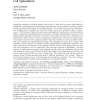Free Online Productivity Tools
i2Speak
i2Symbol
i2OCR
iTex2Img
iWeb2Print
iWeb2Shot
i2Type
iPdf2Split
iPdf2Merge
i2Bopomofo
i2Arabic
i2Style
i2Image
i2PDF
iLatex2Rtf
Sci2ools
POPL
1996
ACM
1996
ACM
A Provably Time-Efficient Parallel Implementation of Full Speculation
that defines abstract costs for measuring or analyzing the performance of computations, (2) to supply the users with a mapping of these costs onto runtimes on various machine models, and (3) to describe an implementation strategy of the language and prove that it meets these mappings. For this purpose we consider a simple language based on speculative evaluation. For every computation, the semantics of the language returns a directed acyclic graph (DAG) in which each node represents a unit of computation, and each edge represents a dependence. We then describe an implementation strategy of the language and show that any computation with w work (the number of nodes in the DAG) and d depth (the length of the longest path in the DAG) will run on a p-processor PRAM in O(w/p + d log p) time. The bounds are work efficient (within a constant factor of linear speedup) when there is sufficient parallelism, w/d p log p. These are the first time bounds we know of for languages with speculative e...
Related Content
| Added | 08 Aug 2010 |
| Updated | 08 Aug 2010 |
| Type | Conference |
| Year | 1996 |
| Where | POPL |
| Authors | John Greiner, Guy E. Blelloch |
Comments (0)

